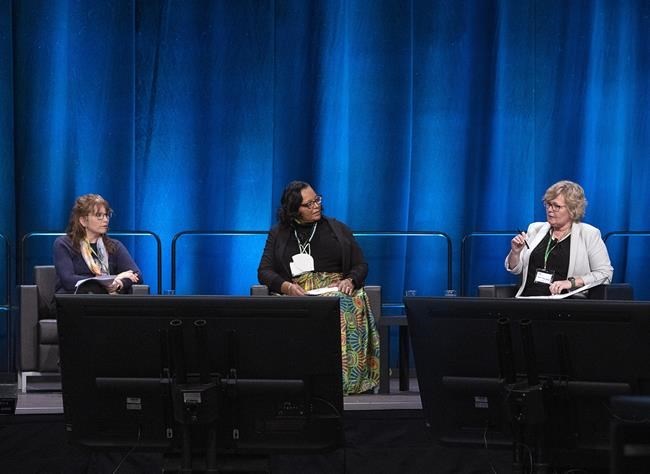HALIFAX — The federal-provincial inquiry investigating the 2020 mass murder in Nova Scotia heard Tuesday from experts who talked about the tragedy's impact on the mental health of Nova Scotians and lingering feelings of loss, anger and frustration.
"And it's affecting people across the country, but Nova Scotia most of all," said Cheryl Myers, head of the Along the Shore Community Health Board. She said about 8,200 people live in the area where the rampage occurred, and they are struggling to rebuild support systems after losing 22 of their neighbours.
"Who do you trust now? How do you move on from this? When the phone rings at night, what do you do?" she asked.
She said local students are reporting difficulty with sleeping, eating and coping in general.
Katherine Hay, CEO of Kids Help Phone, said calls to the mental-health service doubled across Nova Scotia in the hours after the shooting stopped. For months afterwards, one-third of the calls from the province were about feelings of grief and loss that had been compounded by pandemic lockdowns, she said.
"We saw that ripple right across the country," Hay said.
Robin Cann, a private practice therapist in Nova Scotia's Cumberland County, said rural Nova Scotia has had its sense of safety badly shaken.
"This really has been shifted," she told the inquiry, adding that local residents have taken to locking their doors, something they never did before. "What people are describing is increased vigilance and a sense of unease."
Susan Henderson, executive director of the Colchester chapter of the Canadian Mental Health Association, agreed that feelings of safety were shattered. "People really retreated to their homes and said, 'Now what do we do?'" Henderson said.
The inquiry, which is independent of the government, has the power to call witnesses and to subpoena documents.
Its goal is to gather facts to better understand the causes and consequences of what happened on April 18-19, 2020, when a lone gunman disguised as a Mountie killed 22 people, including a pregnant woman, in northern and central Nova Scotia.
The three commissioners leading the inquiry stressed Tuesday that a public inquiry is not the same as a trial. It is not an adversarial process and it cannot make findings of criminal or civil liability.
The inquiry is expected to produce an interim report in May and a final, non-binding report in November.
This report by The Canadian Press was first published Feb. 22, 2022.
The Canadian Press

